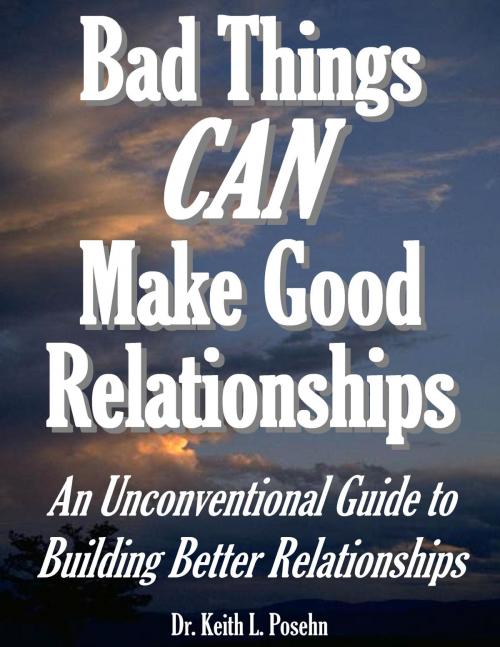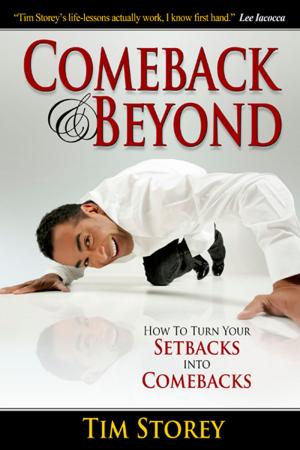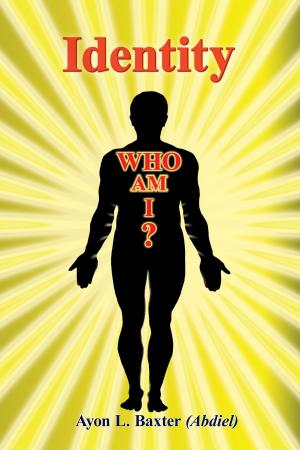Bad Things CAN Make Good Relationships: An Unconventional Guide to Building Better Relationships
Nonfiction, Family & Relationships, Religion & Spirituality, Christianity, Christian Life| Author: | Dr. Keith L. Posehn | ISBN: | 9781476136806 |
| Publisher: | Dr. Keith L. Posehn | Publication: | March 13, 2012 |
| Imprint: | Smashwords Edition | Language: | English |
| Author: | Dr. Keith L. Posehn |
| ISBN: | 9781476136806 |
| Publisher: | Dr. Keith L. Posehn |
| Publication: | March 13, 2012 |
| Imprint: | Smashwords Edition |
| Language: | English |
Relationships. So many trees give their lives in the cause of understanding, improving, dissecting, and building relationships. The lion's share of theses books are written about creating positive, helpful environments for reinforcing our relationships. This book is not one of them.
You see my problem lies in the fact that these environments must be created. It is difficult enough just to live in and understand the environments in which we find ourselves let alone endeavor to create new ones. I always read these books and got fired up about the ideas in the book and went about creating the new environment the author suggested so I could improve my relationships. The trouble was that I worked so hard creating the environment that I lost sight of the improvements I sought for my relationships. The method became the goal and it never worked for me the way I'd hoped or the how author said it would.
After years of frustration I began to wonder how we might better our relationships in the midst of the environment in which we find ourselves. What if we could use our current circumstances and find ways improve our relationships? What if the negative things we all experience in our relationships could somehow be turned into positives? Why can't bad things be used to make good relationships?
There are certain experiences common to the human condition that are almost universally seen as negative forces in relationships: Anger, Unforgiveness, Confrontation, Discrimination. If there was a way to turn these negatives into positives it could be revolutionary. Folks could operate within the common circumstances of their interactions and use them to build better relationships. How Wonderful would that be? So I set off to work.
Being a pastor and convinced that the answers to most every human problem are hidden somewhere in scripture, that's where I started my search. I was amazed to find references fairly easily which seemed to support my hypothesis. Many of these were found in one of the most famous portions of the New Testament: Jesus' Sermon on the Mount. Others were found in equally well known passages, most were the words of Jesus himself - not initially what I expected in this particular search of scripture.
This book is not a Bible study, nor is it intended solely for Christians. The Bible, like most sacred writings, is full of common sense. Sometimes we have to search for it and try to understand its original context to get a clear picture of its meaning, but that does not discount its helpfulness. If you are not a believer, I respectfully ask that you "Suspend Your Disbelief" for a while and try to find the nuggets of truth for your own relationships I think I've discovered.
Whether you seek to better your relationship with God or not, I believe these principles will help you use your current relationship circumstances to improve your interactions with your loved ones and even those you don't love so much. So grab a cup of coffee and a blanket if you are somewhere cold or a cool drink and a beach chair if you are somewhere warm and join me in an odyssey we all live daily. Maybe we can make good use of bad situations. Maybe we can use bad things to make good relationships.
Dr. Keith Layton Posehn
Relationships. So many trees give their lives in the cause of understanding, improving, dissecting, and building relationships. The lion's share of theses books are written about creating positive, helpful environments for reinforcing our relationships. This book is not one of them.
You see my problem lies in the fact that these environments must be created. It is difficult enough just to live in and understand the environments in which we find ourselves let alone endeavor to create new ones. I always read these books and got fired up about the ideas in the book and went about creating the new environment the author suggested so I could improve my relationships. The trouble was that I worked so hard creating the environment that I lost sight of the improvements I sought for my relationships. The method became the goal and it never worked for me the way I'd hoped or the how author said it would.
After years of frustration I began to wonder how we might better our relationships in the midst of the environment in which we find ourselves. What if we could use our current circumstances and find ways improve our relationships? What if the negative things we all experience in our relationships could somehow be turned into positives? Why can't bad things be used to make good relationships?
There are certain experiences common to the human condition that are almost universally seen as negative forces in relationships: Anger, Unforgiveness, Confrontation, Discrimination. If there was a way to turn these negatives into positives it could be revolutionary. Folks could operate within the common circumstances of their interactions and use them to build better relationships. How Wonderful would that be? So I set off to work.
Being a pastor and convinced that the answers to most every human problem are hidden somewhere in scripture, that's where I started my search. I was amazed to find references fairly easily which seemed to support my hypothesis. Many of these were found in one of the most famous portions of the New Testament: Jesus' Sermon on the Mount. Others were found in equally well known passages, most were the words of Jesus himself - not initially what I expected in this particular search of scripture.
This book is not a Bible study, nor is it intended solely for Christians. The Bible, like most sacred writings, is full of common sense. Sometimes we have to search for it and try to understand its original context to get a clear picture of its meaning, but that does not discount its helpfulness. If you are not a believer, I respectfully ask that you "Suspend Your Disbelief" for a while and try to find the nuggets of truth for your own relationships I think I've discovered.
Whether you seek to better your relationship with God or not, I believe these principles will help you use your current relationship circumstances to improve your interactions with your loved ones and even those you don't love so much. So grab a cup of coffee and a blanket if you are somewhere cold or a cool drink and a beach chair if you are somewhere warm and join me in an odyssey we all live daily. Maybe we can make good use of bad situations. Maybe we can use bad things to make good relationships.
Dr. Keith Layton Posehn















